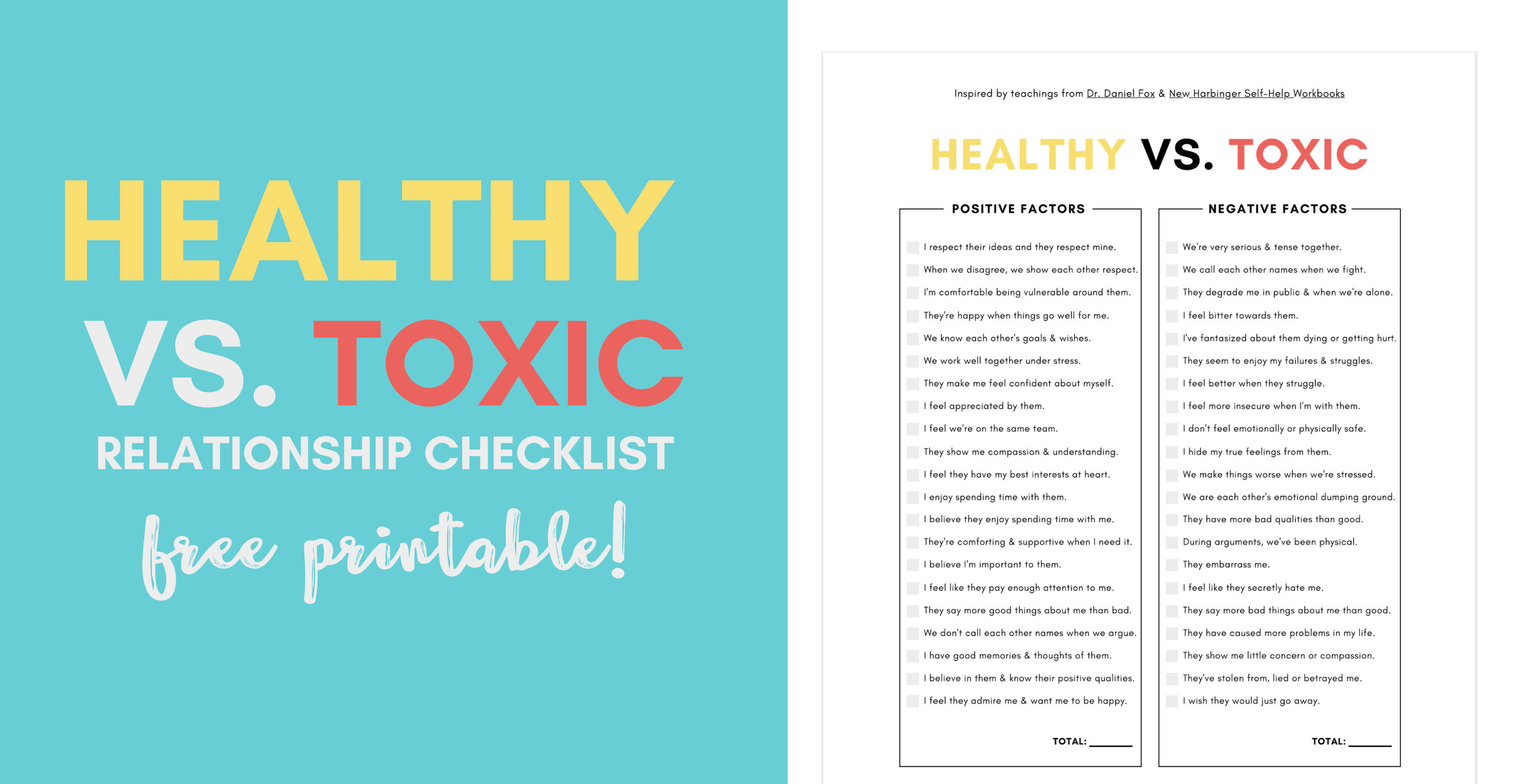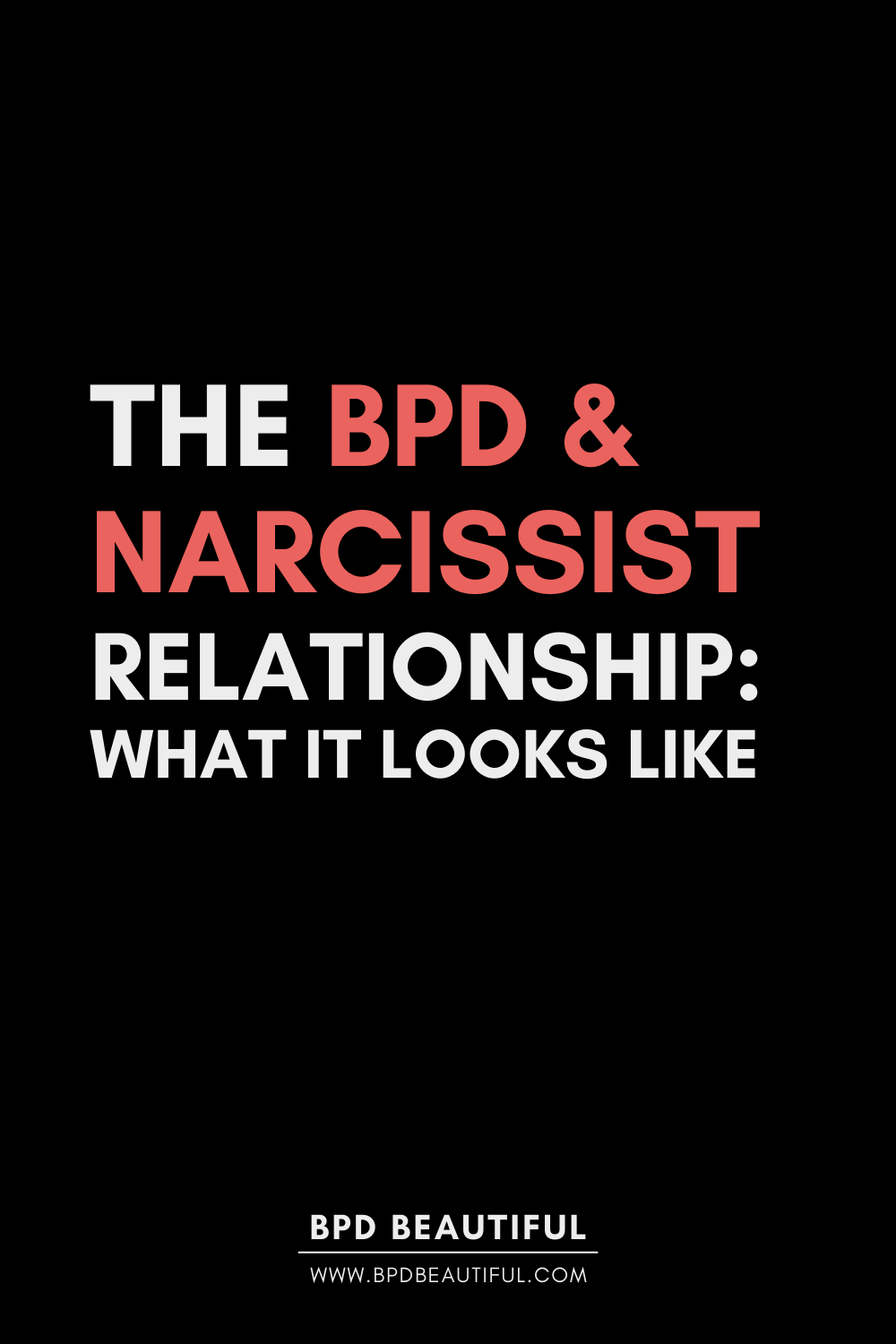Trigger Warning: Narcissistic abuse, abuse from those with BPD traits. “Borderline” and “Narcissist” are used as a label for simplicity purposes (battlers are not defined by their diagnosis). Read at your own discretion.
Why Borderlines & Narcissists Attract Each Other
A big topic in the BPD community is the borderline and narcissist relationship. Ask any mental health professional and they’ll tell you that these two types of personality disorders tend to attract each other. The borderline and narcissist relationship is prevalent & typically abusive. Most likely, a BPD and narcissist couple are incredibly toxic together.
In other words, it’s worth talking about.
People choose romantic partners who are their equals in regards to intimacy. The reason the borderline and narcissist’s relationship is so widespread is because people with BPD and narcissistic personality disorder (NPD) share some of the same intimacy issues. In a nutshell, both groups tend to lack ‘whole object relations’ which is the capacity to simultaneously see both the good and the bad.
Both people with BPD and people with NPD lack “object constancy” which is a fancy way of saying they don’t naturally have the ability to maintain positive feelings over someone while they’re feeling hurt, disappointed or angry with them. People with BPD and NPD also struggle with maintaining emotional connections to someone who is no longer around.
(Read ’35 Signs You’re in a Borderline and Narcissist Relationship’)
Recently, this post I put together for BPD Beautiful made its round of shares on social media. In the comments, one follower shared a screenshot of a text thread between them and their partner – it’s since been deleted for their privacy. They’d sent the graphic to their partner in hopes to shed some light on the many bpd traits and bpd symptoms. Who doesn’t want to feel understood by the person they love?
But instead, the user was met with invalidation, ridicule and abrasiveness.
“Yes, I agree you have BPD. I’m aware,” the partner said in response [paraphrased]. “Don’t send this shit to me. I get enough of it on Snapchat, now you’re spamming our texts too.”
Of course, the responses to this screenshot showed alarm for this follower’s wellbeing. “That’s abusive.” “You should leave.” “This isn’t someone who will help you get better.” “Even if you did talk about your BPD a lot, there’s no reason for them to be so harsh and minimizing. It makes sense you’d want to talk about it. You live with it everyday!”
The follower was astonished with everyone’s comments. Despite being crushed by their partner’s reaction, they didn’t think the red flags were a big enough deal to consider leaving them over. They mentioned their partner had “some narcissistic traits” but that they were an overall chill person. I was happy to read by the end of the thread, they’d said the comments had given them a lot to think about. Hopefully they’ve broken up with their partner by now.
If you can’t already tell, I’m of the opinion that a BPD and narcissist couple should not be. Of course there are exceptions to everything in life—but a big component of NPD, from my understanding (I’m not a mental health professional) is an inabilty to empathize. A person with BPD, on the other hand, requires a lot of validation and patience in a partner, both of which require empathy.
An Inside Look to a BPD and Narcissist Couple
I was one half of a BPD and narcissist couple for ten years – of course, I only knew my ex was narcissistic in hindsight. I’m about a year and a half out of the relationship, and I’m still healing from his abuse. It was the most intense, romantic and simultaneously the worst relationship I’ve ever been in. I tend to avoid using superlatives like “always” or “never” because they suggest splitting, but in this case – it’s more than appropriate. Never have I loved someone so strongly and genuinely, and never have I been treated so poorly and disdainfully by a partner.
At the start of our borderline and narcissist relationship, things looked like a Hollywood romance. I was only 21 and pretty naive, he was 26 and more experienced. We both met through our local music scene and formed a band together. We were mirrored images of each other. My borderline mirroring was due to an inept need to be validated, desired, fulfilled and accepted. His narcissistic mirroring was done so I’d let my guard down and so he could stay convinced that he was a good catch despite him sleeping on a couch, being an unlicensed chronic drinker without a steady career. My last partner, and the father of my son, was two years younger than him and had his shit together. I knew my narcissistic ex was jealous of him.
We were both control freaks. Both moody. Both prone to anger. We both allegedly had a history of suicidal ideation – although, in hindsight, his was done for manipulative purposes; he pulled out the suicide card whenever I’d had enough and wanted to call it quits. My suicidal ideation sprung up due to overwhelming emotions triggered by my fear of abandonment and a despairing sense of emptiness. He hid his feelings much better than me. He absolutely loved my clinginess because it made him feel needed, until he didn’t love it anymore.
It took 6 months until shit hit the fan and he began to discard me (we both idealized and devalued the other a lot over the years – that’s a common shared trait in people with BPD and NPD). Then he used my fear of abandonment, my clinginess and everything I’d told him in confidence against me. His lack of empathy came to light and I was sometimes shocked someone could be so callous and unconcerned for the wellbeing of others – especially someone he claimed to love. I spent most of the borderline and narcissistic relationship confused, chasing after him, begging for his love and wracking my brain for ways to improve things – for ways to improve myself so I could be a better, more stable partner to a man who didn’t deserve it.
As is stereotypical for a BPD and narcissist couple, we were volatile in our interpersonal interactions with others as well. We were known to be a bit crazy. We’d made a reputation for ourselves in our local music scene as being quick to replace band members. We got into a massive, publicly humiliating fight with another local band. We’d announce band breakups between each other on social media then get back together a couple weeks later.
We broke up and got back together constantly. He’d usually hoover me back, but there were times I did the hoovering as well – of course, our motivations were vastly different. Our longest separation was 1 year, after he moved to live across the country with his family. I was too inexperienced and hopeful of his change to realize that he was only hoovering me because his license (that I helped him get years before) was suddenly suspended after getting a DUI. I paid for a one way plane ticket and drove him back in his car on my dime. He was seemingly using me as a chauffeur because if he had stayed in the state where he was living, his family wouldn’t have been able to keep driving him to work.
We got married within 4 years and I convinced myself, for a time, that he was a decent support person – I even sang his praises on some of my older blog posts (which is embarrassing, to say the least). Once I was finally diagnosed with BPD, telling him was a mistake. He used it as leverage to remain in control. He’d project his negative traits onto me and say I never appreciated his efforts or that I expected him to be perfect – even long after I had stabilized my moods, decreased my expectations, saw things more realistically and learned to manage the splitting.
Back in the present in fall 2023, I’m still waiting for the final judgement of our divorce. I had to file for bankruptcy last year because everything was in my name (despite my efforts to help him build up his own credit), including a brand new car for him that he insisted he needed and convinced me to buy by using my fear for his safety against me. Thank God we didn’t have kids of our own together, but we were certainly close to trying to conceive just before I realized it was completely hopeless and left him for good.
If you find yourself a part of borderline and narcissist relationship – I’m going to advise you get the hell out of it as soon as possible. The abuse just isn’t worth it. If you’re not convinced, continue reading to see another example of a BPD and narcissist couple.
Another BPD and Narcissist Couple
Back when I was in middle school long before I knew I have borderline personality disorder—I saw a borderline and narcissist relationship play out firsthand. This relationship was between my mother (the person with narcissistic traits) and her emotional and incredibly controlling boyfriend (the person with borderline traits). At thirteen, I couldn’t quite put my finger on what was wrong with this relationship but I knew deep down it was toxic, abusive and in no way something I wanted to experience myself.
The first time my mother met this man was at our home when he came to pick her up for their first date. She’d met him online during the early 2000’s when internet dating had just started taking off. Of course, having a stranger come to your house to meet you and your kids for the first time isn’t safe. My mom always had a habit of putting her love life above everything else, including the safety of her children, and she ignored any and all red flags.
As their relationship quickly progressed — her boyfriend didn’t want her to do anything without his approval. This could mean spending time with her children or friends, keeping her natural hair color, stopping home after work before heading to his place, driving back home from his place without talking on the phone, etc etc etc. If she did what she wanted anyway, which she often did, he’d blow up and say she didn’t love him. He’d beg, he’d cry and have public outbursts.
Later on, after the inevitable ‘final’ break up (there were many), she told me about the red flags she’d ignored. She didn’t tell me these things to teach me a lesson but to confide in someone (even her teenage daughter). In spite of that—I listened, reflected and tried to learn better.

DOWNLOAD FREE PRINTABLE
Measure how healthy or unhealthy your BPD relationship is with the Healthy vs. Unhealthy Relationship Checklist.
“I knew he was trouble when I gave him our number and he called three times in a row,” she’d said. “By the third call, he left a message saying, ‘if you don’t want to actually go out, the least you could do is be honest and tell me!’ — who does that, right?!”
I nodded in blind agreement, my young eyes wide with interest. It was past 11PM and a school night, but my mom wasn’t concerned about me getting to sleep. And I was too busy enjoying the feeling of being included in yet another adult conversation to advocate for my own wellbeing.
“He came to my job, ya know, during a fight,” she continued. “He had a garage bag full of my stuff…clothes, things I left at his apartment. He yelled and ripped it open. Then he threw it all down the hall in front of everyone. My boss saw it and told me he could never visit again. I should have known then.”
“Wow.”
“You know he hit me once. I didn’t tell you this because I didn’t want to scare you. But he did. In the parking lot at work. I even told my sister: ‘if anything happens to me, it’s him.’”
“Geez, mom.”
“I know, I know,” she waved me off with a small twinkle in her dead eyes. She enjoyed every second of this conversation. “But he was so romantic and loyal. He never would have cheated on me like your father did. That’s why I stayed.”
It didn’t dawn on me until years later that mere faithfulness is the lowest standard a person could have for a partner. Loyalty is the bare minimum. There’s also emotional health, communication skills, mutual respect, shared values, shared life goals, a stable career, financial responsibility, etc etc etc. But I digress.
Of course, through my mother’s perspective, she didn’t play a role in the toxicity of this failed borderline and narcissist relationship. But she absolutely did.
My mother—a narcissist, fed off the emotional reactions of others. She pushed buttons by showing how little she truly cared or by pretending not to know better, she’d invalidate concerns and seemed to enjoy being the center of attention when shit hit the fan.
Her boyfriend—a person with many borderline traits, feared her abandonment and would desperately try to prevent it by both controlling her every move or by abandoning her first.
“She doesn’t want to come over tonight, so I’m punishing her by leaving early,” he’d said to me one day during one of their many arguments. I’d come outside to try and stop him. Because as a daughter of a narcissistic mother, it was my job to try and save her from heartache.
“Why don’t you just talk about it with her? I’m sure she’s just tired from work. She doesn’t mean to hurt you.”
“No, if she cared she’d come over.”
And so he left. I watched him get on his motorcycle and ride away down the street.
I remember thinking his response was odd and childish. I don’t know how I had that insight at thirteen years old with no healthy relationship to model after (apart from TV couples like Eric and Annie Camden from 7th Heaven or Martha and Jonathon Kent on Smallville), but I did. I also knew, deep down, that I acted the same way with my own boyfriend.
In many ways, I related to this man and I felt for him. He wasn’t necessarily a bad guy that wanted to harm the person he loved, he was just incredibly lost and mentally ill. Maybe that’s a big reason why I’m better today. I didn’t want to be like him in my 40’s. And I didn’t want to be with someone like my mother, or be anything like her.
That night ended with my mom relaxing in her room like nothing was happening and our house phone ringing off the hook as he called, over and over again to no response. The voicemails he left sounded like an abandoned child’s. He went from sobbing and raging to yelling and begging all in the span of minutes.
They got back together the next day and this cycle continued on for a very long year. I watched as my mother ran dramatically to his arms when he came over the next evening. I remember cringing and quickly turning to go back to my bedroom. Watching them make up became more and more off putting the more I saw it.

BPD in Relationships
Of course, the above mentioned BPD and narcissist couple is just example of how these two personality disorders or traits can play out together. Neither were happy. Both were toxic. And ultimately, the relationships failed.
That’s not to say every person with borderline personality disorder will fall for a narcissist. Sometimes they’ll fall for person who also has BPD or someone who exhibits BPD traits. There are also times the borderline is the abuser to someone without a personality disorder at all. And, there are times someone with BPD isn’t naturally an abuser and has self-awareness but will also exhibit toxic, abusive traits that won’t make for a healthy relationship. The ladder could potentially be improved with treatment and hard work – if the person is willing to take that step.
BPD in relationships make things complicated. But I do believe there’s hope for some. I’ve said this many times on social media and on this blog, and have sometimes received criticism in response (by people with BPD and without), but I’ll keep saying it: it’s been proven that BPD is treatable.
Recovery is possible for people living with BPD. Contrary to old beliefs in the medical world, recent research & studies of BPD have confirmed that treatment is not only possible but that BPD also has a high recovery success rate.
According to Perry D. Hoffman, Ph.D. of the National Education Alliance for Borderline Personality Disorder, research conducted by the National Institute of Mental Health shows:
- After two years, more than 50% patients recover.
- After 10 years, more than 80% recover.
- 88% remain in recovery.
Because our BPD is treatable, we are capable of having healthy relationships. They take more work than the average couple and I still wouldn’t recommend dating an untreated person with narcissistic traits when you have BPD, but it’s not hopeless. If you’re struggling with BPD, get help. Join a DBT program. Learn about healthy communication and the red flags of an abusive relationship.
(Read ‘Healthy vs. Toxic Relationships: BPD Edition’)
Take accountability for the toxic traits you may possess and be okay with being less than perfect. Self-reflect and consider your relationships with others. Are they toxic? Do they help you grow? Are you preventing them from growing? These are important questions to consider.
Practice self-care. Practice mindfulness. And most importantly, don’t give up on yourself. Believe you can do better and eventually, you will.
BPD Resources
Learn more about Sadie’s Favorite – an upcoming novel about a woman with BPD. Manage your BPD symptoms with a printable workbook. Book an affordable coaching call with Audrey. See our recommended list of books about BPD. Download a free meditation app. Try a free trial of unlimited Virtual EMDR. Get 20% off your first month of online therapy with code THERAPY20 (financial aid options now available at checkout!).
Start a Discussion
Do you have experience as a BPD and narcissist couple? Share your borderline and narcissist relationship story in the comments.
Pin This Post
Liked this post? Please help support BPD Beautiful and spread BPD awareness by pinning it on Pinterest.



Comments
One response to “The BPD and Narcissist Couple: What it Looks Like”
Thank you for writing this article.
I just realized within the last day that my former significant other has undiagnosed BPD. We were together for 25 years. It was never easy, but there was love, and I’ve always tried to be supportive and patient. A crisis involving her adult son’s drug addiction destabilized her. Then a narcissist started pursuing and love-bombing her, and she left me for him four months ago. From what she’s been telling me, their relationship is turning volatile. I found your article helpful in better understanding this dynamic.